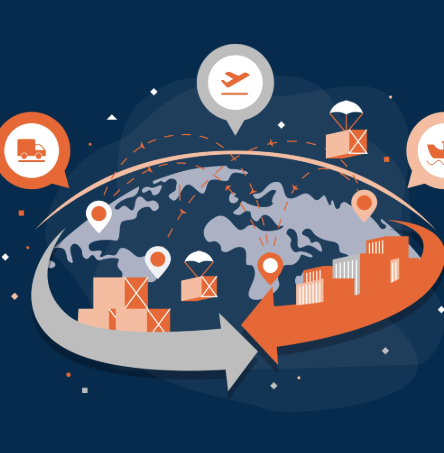How AI is Revolutionizing Customer Returns in Logistics

The logistics industry is undergoing a transformation, especially in the area of customer returns. As e-commerce continues to grow, businesses are facing the challenge of managing high return rates. On average, online retailers experience return rates of 20% to 30%, and managing these returns can be more expensive than the original delivery itself. To address these challenges and improve customer satisfaction, companies are turning to Artificial Intelligence (AI) for solutions that streamline the returns process and reduce costs.
The Challenges of Managing Customer Returns
The growth of e-commerce has made online shopping easier, but it has also led to a rise in return rates. Since customers can’t physically inspect products before purchasing, they are more likely to return items that don’t meet their expectations. Unlike in-store purchases, where returns are typically 5% to 10%, e-commerce returns can be much higher, reaching up to 40%.
Another significant hurdle is reverse logistics—the process of managing returns and moving products from customers back to manufacturers or retailers. This process is often costly and complex, involving multiple steps like inspection, testing, and refurbishment. With varying conditions of returned products, companies must assess whether items are suitable for resale or need to be disposed of, adding further complications.
How AI is Transforming Customer Returns Management
AI is proving to be an invaluable tool in managing the challenges of customer returns. Here’s how AI is making a difference:
Predictive Analytics
AI can analyze customer data and past returns to identify trends, such as items with high return rates or issues like incorrect sizing. By predicting future return patterns, businesses can make informed decisions about inventory management and improve product listings. For instance, if AI identifies that certain product descriptions are leading to high return rates, adjustments can be made to provide more accurate information to customers.
Understanding Customer Behavior
AI helps businesses understand customer behavior by analyzing past purchasing and returning patterns. By identifying the reasons behind frequent returns, AI can suggest alternative products that better match a customer’s preferences, reducing the likelihood of a return. For example, if a customer consistently returns a specific clothing size or style, AI can recommend alternatives that may be a better fit, ultimately improving customer satisfaction.
Integration with Supply Chain Processes
AI can be integrated into the supply chain to optimize inventory levels and reduce waste. Machine learning algorithms can forecast demand, ensuring businesses only stock what is needed, which minimizes overstocking and understocking issues. In warehouses, AI-powered robots can automate repetitive tasks, improving the speed and accuracy of returns processing. This reduces labor costs and the potential for human error, making the process more efficient.
Sustainability and Waste Reduction
AI also helps reduce the environmental impact of returns by analyzing data to identify common reasons for returns. This insight enables businesses to make more sustainable decisions, such as designing products that are less likely to be returned or adjusting marketing strategies to better align with customer expectations. Additionally, by optimizing return routes and reducing unnecessary transportation, AI can help reduce carbon emissions associated with logistics.
The Role of AI Consulting in Customer Returns Optimization
To fully leverage the power of AI, many companies turn to AI consulting firms for expertise in implementing AI solutions. These consultants provide valuable guidance to ensure that AI is effectively integrated into logistics operations. Here’s how AI consulting can make a difference:
Expertise in AI Implementation
AI consultants bring specialized knowledge of AI technologies and can recommend the best solutions for managing returns. They understand the nuances of logistics operations and can guide businesses through the process of integrating AI tools that meet their specific needs.
Customization and Optimization
Every business has unique challenges, and AI consultants can customize AI models to suit the specific return management requirements of a company. Whether it’s predicting return rates or automating returns processing, consultants can optimize AI tools to improve efficiency and reduce costs.
Data-Driven Insights
AI consultants can help businesses gather and analyze return data to uncover actionable insights. These insights can inform decisions around inventory, product development, and customer service, helping to reduce returns and improve overall satisfaction.
Sustainability and Waste Reduction
AI consultants can also help businesses align their return processes with sustainability goals. By optimizing logistics operations and reducing waste, businesses can lower their environmental impact and promote more eco-friendly practices.
Continuous Improvement
AI is an evolving field, and consultants ensure that businesses stay ahead of technological advancements. Through ongoing support, AI consultants help companies refine their systems and adapt to changing customer behaviors and market dynamics.
Conclusion
AI is changing the way businesses handle customer returns in logistics. By using predictive analytics, understanding customer behavior, optimizing supply chain processes, and focusing on sustainability, businesses can significantly improve returns management. AI not only reduces costs and increases efficiency but also enhances customer satisfaction by offering a more personalized and streamlined returns experience. As AI continues to evolve, its impact on the logistics industry will only grow, providing companies with the tools they need to stay competitive and customer-focused.




